★★★
“The grubby truth about vengeance.”
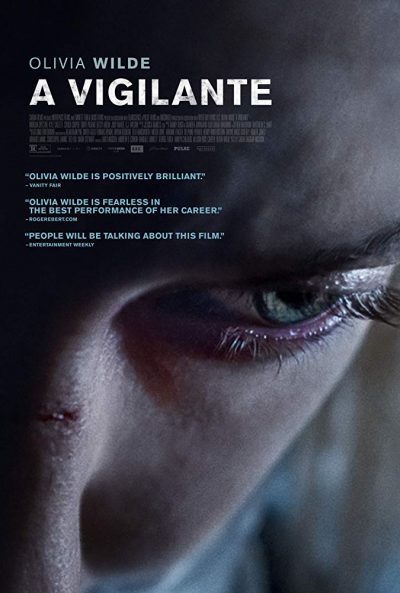 Sadie (Wilde) has escaped from an abusive relationship with her husband (Spector), but at a terrible cost: the death of her son. In an effort to come to terms with her grief, and make use of the survivalist skills forcibly imposed on her, she becomes a vigilante. Responding to coded messages left on her phone, she travels around to confront abusers and prove that there is someone tougher, willing to stand up for the victims against them. But this doesn’t give Sadie the closure or peace that she seeks. Before she can help others, she’s first going to have to help herself, and confront the man who made her what she is.
Sadie (Wilde) has escaped from an abusive relationship with her husband (Spector), but at a terrible cost: the death of her son. In an effort to come to terms with her grief, and make use of the survivalist skills forcibly imposed on her, she becomes a vigilante. Responding to coded messages left on her phone, she travels around to confront abusers and prove that there is someone tougher, willing to stand up for the victims against them. But this doesn’t give Sadie the closure or peace that she seeks. Before she can help others, she’s first going to have to help herself, and confront the man who made her what she is.
There’s a grim, messy realism about this, which is plausible, and is both the film’s biggest strength and its greatest weakness. Violence, or the threat thereof, doesn’t really solve anything, and there’s precious little satisfaction gained by Sadie from it. Or anyone else: you could argue that, by robbing others of their agency, she’s doing more harm than good. But nor does this mundane approach make for great cinema. It’s one thing to rob vigilante violence of its adrenaline-powered rush, and the film consciously does that, even cutting away during the final confrontation between protagonist and antagonist. However, the film-maker needs to find something to replace it, otherwise you’re left with an empty experience. Admittedly, that may be the intended conclusion here. Yet if your point is the pointlessness of it all… what’s the point?
There is something to be said for the banality of the evil we see portrayed here, especially in the first case, when the well-dressed businessman is revealed to be an abuser. Yet, I can’t help noting the complete lack of any due diligence by Sadie. If a woman says she’s abused, well, that’s clearly good enough to justify a good helping of the old ultraviolence. A less polemic film might have leveraged that into its story, though again, perhaps her lack of interest in justice (despite her stressed reluctance to kill) is part of the flawed package she represents, along with a supreme disinterest in what happens to anyone after she has left the building.
The looming presence of her abusive husband is a little too convenient, especially in the way he suddenly pops up when dramatically necessary; some kind of foreshadowing would have helped. No denying the strength of Wilde’s performance though, and you get to see and feel every ounce of pain as she experiences it, in a way that becomes almost uncomfortable to watch. In the end, however, it doesn’t really tell us anything we didn’t already know. No matter how many “upbeat” vigilante movies I see, I enjoy them purely for the cathartic exercise, not as a primer. I don’t think I need a cinematic antidote like this, in order to be reminded that it’s actually not a good thing to take the law into your own hands.
Dir: Sarah Daggar-Nickson
Star: Olivia Wilde, Morgan Spector, Kyle Catlett, C.J. Wilson





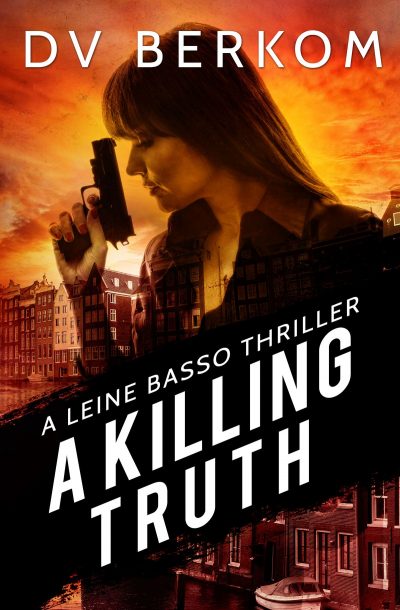 Leine (short for Madeleine) Basso quit her job as a somewhat-sanctioned government assassin, after realizing her boss was using her to carry out off-book, non-sanctioned ops for his personal gain. Oh, and he also tricked her into killing her lover, and b Initially working in private security, she is hired on a reality show, following the murder of a contestant (Book 1: Serial Date) by a serial killer out to make a point. Leine’s daughter is abducted, and it turns out the perpetrator is a shadow from her past, with a grudge.
Leine (short for Madeleine) Basso quit her job as a somewhat-sanctioned government assassin, after realizing her boss was using her to carry out off-book, non-sanctioned ops for his personal gain. Oh, and he also tricked her into killing her lover, and b Initially working in private security, she is hired on a reality show, following the murder of a contestant (Book 1: Serial Date) by a serial killer out to make a point. Leine’s daughter is abducted, and it turns out the perpetrator is a shadow from her past, with a grudge. That’s a technical issue, not particularly relevant to this review, however. To be honest, when I got the first book, I was expecting more globetrotting assassinations, and less stuff more befitting a PI or homicide detective, which is really what the first two books are more like. Things perk up considerably in #3, with Leine having to handle life south of the border; you’ll probably be crossing Mexico off your list of potential destinations by the time you’re done there. They do seem – consciously or not – to become more exotic and international, as they go on. #4 and #5 take place almost exclusively abroad, to the point that I felt a bit sorry for Leine’s boyfriend, who must barely see her!
That’s a technical issue, not particularly relevant to this review, however. To be honest, when I got the first book, I was expecting more globetrotting assassinations, and less stuff more befitting a PI or homicide detective, which is really what the first two books are more like. Things perk up considerably in #3, with Leine having to handle life south of the border; you’ll probably be crossing Mexico off your list of potential destinations by the time you’re done there. They do seem – consciously or not – to become more exotic and international, as they go on. #4 and #5 take place almost exclusively abroad, to the point that I felt a bit sorry for Leine’s boyfriend, who must barely see her!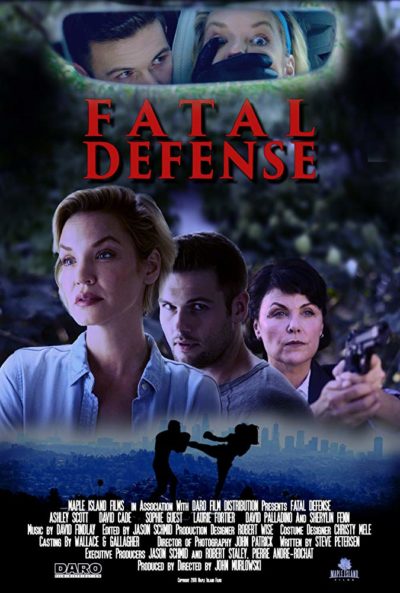 Single mother Arden Walsh (Scott) and her daughter Emma (Guest) are traumatized by a home invasion, and at the insistence of mom’s cop sister, Gwen (Fortier), Arden signs on for a self-defense class given by the hunky Logan Chase (Cade). He’s a bit… intense, shall we say. Despite some initial bonding over their ex-marriedness, it’s not too long before Arden discovers his methods leave “unconventional” lying in the dust. Probably about the point where he zip-ties Arden and tosses her in the trunk of his car. At this stage, she decides to forego further classes. Except, Logan is having none of it, and even teams up with the original burglar to put Arden through further “training”.
Single mother Arden Walsh (Scott) and her daughter Emma (Guest) are traumatized by a home invasion, and at the insistence of mom’s cop sister, Gwen (Fortier), Arden signs on for a self-defense class given by the hunky Logan Chase (Cade). He’s a bit… intense, shall we say. Despite some initial bonding over their ex-marriedness, it’s not too long before Arden discovers his methods leave “unconventional” lying in the dust. Probably about the point where he zip-ties Arden and tosses her in the trunk of his car. At this stage, she decides to forego further classes. Except, Logan is having none of it, and even teams up with the original burglar to put Arden through further “training”.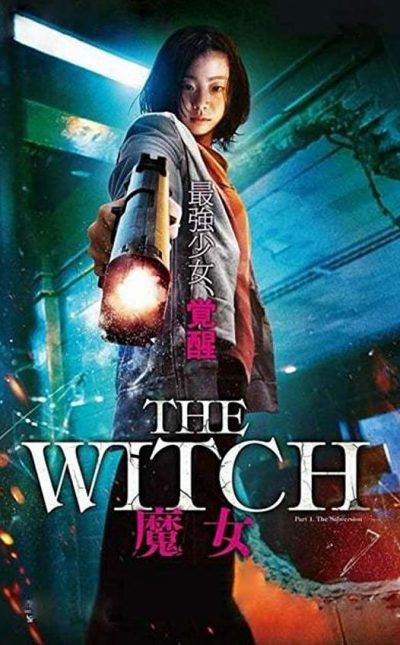 The first in an intended trilogy, this stands on its own reasonably well, balancing between tying up the loose ends and leaving the future uncertain. The heroine is Ja-Yoon (Kim), who begins by escaping from a shadowy, quasi-governmental facility as a raw eight-year-old, despite being hunted by the woman in charge, Dr. Baek (Jo) and her minions. She is found by husband and wife farmers, and they adopt Ja-Yoon, who has no apparent memory of her early life as their own. Ten years later, with Mom suffering from Alzheimer’s, and the farm struggling financially, Ja-Yoon enters a nationwide singing contest. However, the resulting attention brings her firmly back on the radar of Dr. Baek and Nobleman (Choi), the other survivor from that night a decade ago. The not-so-good doctor won’t let Ja-Yoon escape this time.
The first in an intended trilogy, this stands on its own reasonably well, balancing between tying up the loose ends and leaving the future uncertain. The heroine is Ja-Yoon (Kim), who begins by escaping from a shadowy, quasi-governmental facility as a raw eight-year-old, despite being hunted by the woman in charge, Dr. Baek (Jo) and her minions. She is found by husband and wife farmers, and they adopt Ja-Yoon, who has no apparent memory of her early life as their own. Ten years later, with Mom suffering from Alzheimer’s, and the farm struggling financially, Ja-Yoon enters a nationwide singing contest. However, the resulting attention brings her firmly back on the radar of Dr. Baek and Nobleman (Choi), the other survivor from that night a decade ago. The not-so-good doctor won’t let Ja-Yoon escape this time. An amiable piece of light fluff from Korea, while this probably doesn’t need to be 117 minutes long, the time passed comfortably enough. After many years of failing the civil service entrance exam, Jang Young-shil (Kang) finally succeeds and is rewarded with a contract job in the national security agency. However, she’s still mediocre, and is laid off. Fortunately, she overhears her boss (Jo) having been phone-phished out of $500,000 of departmental funds, and is the only agent available to go undercover in the ‘boiler room’ carrying out these scams. There, she recognizes another employee, Na Jung-an (Han) – having seen her take out a pickpocket on the subway, she knows Na is an undercover cop. The two women, of sharply disparate backgrounds and skill-sets, form an uneasy alliance, seeking to take down the charismatic boss of the con company, Min Seok (Namkoong).
An amiable piece of light fluff from Korea, while this probably doesn’t need to be 117 minutes long, the time passed comfortably enough. After many years of failing the civil service entrance exam, Jang Young-shil (Kang) finally succeeds and is rewarded with a contract job in the national security agency. However, she’s still mediocre, and is laid off. Fortunately, she overhears her boss (Jo) having been phone-phished out of $500,000 of departmental funds, and is the only agent available to go undercover in the ‘boiler room’ carrying out these scams. There, she recognizes another employee, Na Jung-an (Han) – having seen her take out a pickpocket on the subway, she knows Na is an undercover cop. The two women, of sharply disparate backgrounds and skill-sets, form an uneasy alliance, seeking to take down the charismatic boss of the con company, Min Seok (Namkoong).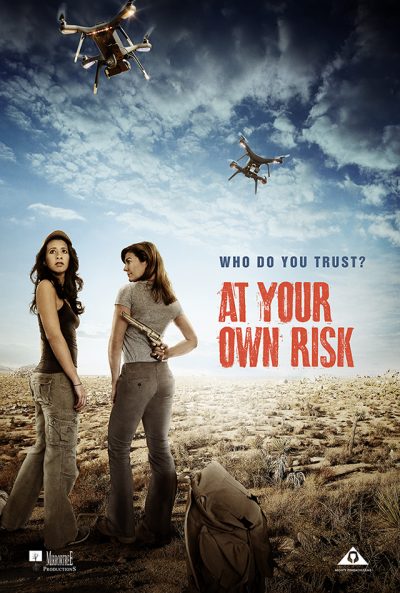 This is one of those films where
This is one of those films where  It’s quite a feat for a film which runs a crisp 67 ½ minutes to outstay its welcome, so… Well done? The problem is mostly that far too much time is wasted on the set-up, introducing us – in quite excruciating detail – to characters in whom we have little or no interest. These would be the friends who decide to spend a weekend in upstate New York, unaware they are about to cross paths with a pair of bored locals who have decided to alleviate the tedium by going on a killing spree. When one of them gets cold feet, however, it’s left up to Cat (Rafferty) to follow through on the original plan, which she does with some enthusiasm. Just a pity this doesn’t happen until roughly the final twenty minutes.
It’s quite a feat for a film which runs a crisp 67 ½ minutes to outstay its welcome, so… Well done? The problem is mostly that far too much time is wasted on the set-up, introducing us – in quite excruciating detail – to characters in whom we have little or no interest. These would be the friends who decide to spend a weekend in upstate New York, unaware they are about to cross paths with a pair of bored locals who have decided to alleviate the tedium by going on a killing spree. When one of them gets cold feet, however, it’s left up to Cat (Rafferty) to follow through on the original plan, which she does with some enthusiasm. Just a pity this doesn’t happen until roughly the final twenty minutes.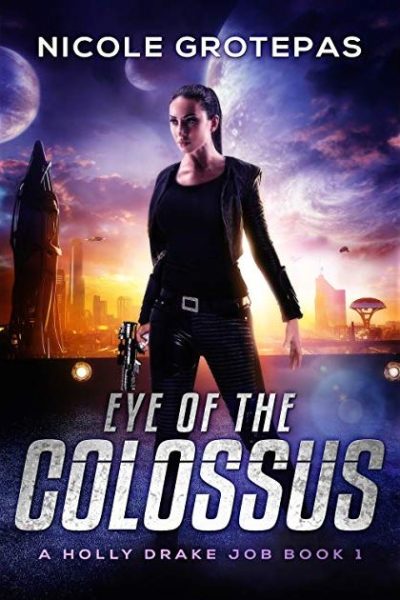 This probably picked up half a star in the final couple of chapters, because up until the end, the plot seemed to have some huge deficiencies. While most of these were certainly addressed by the final resolution, it still left a rather questionable taste in my literary mouth [if you see what I mean!]. The heroine is Holly Drake, who has been unjustly sent to prison after killing her abusive husband. Unfortunately, he was a police officer, and some of his dubious colleagues helped ensure Holly went to jail for it. On release, her previous career as a teacher is no longer an option, and she’s largely thrown on to the charity of her sister, Meg, also a cop.
This probably picked up half a star in the final couple of chapters, because up until the end, the plot seemed to have some huge deficiencies. While most of these were certainly addressed by the final resolution, it still left a rather questionable taste in my literary mouth [if you see what I mean!]. The heroine is Holly Drake, who has been unjustly sent to prison after killing her abusive husband. Unfortunately, he was a police officer, and some of his dubious colleagues helped ensure Holly went to jail for it. On release, her previous career as a teacher is no longer an option, and she’s largely thrown on to the charity of her sister, Meg, also a cop.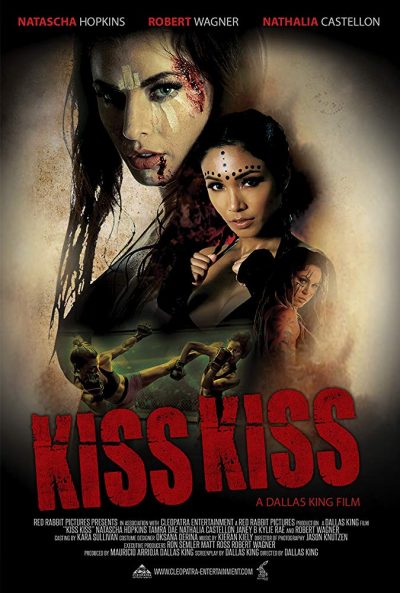 Four exotic dancers go on a trip to vineyard, courtesy of a customer at their club. However, they get more than they bargained for, falling unconscious and waking up to find themselves test subject in a scientific experiment run by Gibson (Wagner – no, not that one). He is attempting to convince the military-industrial complex to invest in his project to create “super soldiers”. To this end, he has a serum which vastly enhances both aggression and compliance, and has invited Senator Graham (Farino) to witness a test, under carefully controlled laboratory conditions. Oh, who am I trying to kid: he actually just shoots up the strippers with the serum and makes them fight to their deaths. In sports bikinis. And face-paint. In subdued yet artistic lighting. Because science! And that’s how government funding works!
Four exotic dancers go on a trip to vineyard, courtesy of a customer at their club. However, they get more than they bargained for, falling unconscious and waking up to find themselves test subject in a scientific experiment run by Gibson (Wagner – no, not that one). He is attempting to convince the military-industrial complex to invest in his project to create “super soldiers”. To this end, he has a serum which vastly enhances both aggression and compliance, and has invited Senator Graham (Farino) to witness a test, under carefully controlled laboratory conditions. Oh, who am I trying to kid: he actually just shoots up the strippers with the serum and makes them fight to their deaths. In sports bikinis. And face-paint. In subdued yet artistic lighting. Because science! And that’s how government funding works!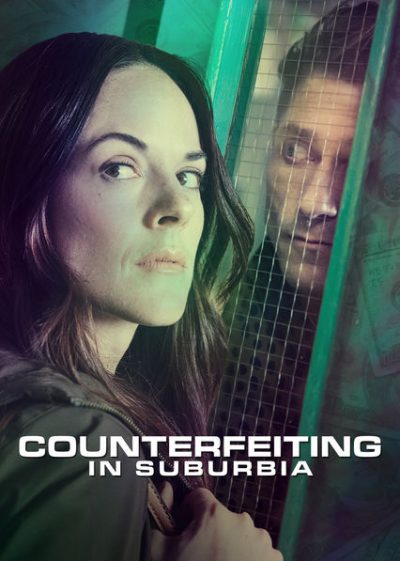 High-schoolers Reilly (Albuquerque) and Erica (Wallace) have discovered a way to literally print money, forging hundred-dollar bills. They then use these to buy high-end fashion, and sell these ill-gotten gains on to their schoolmates for genuine cash. The more cautious Reilly wants to stop, but realizes she can do good by helping Karen (Butler), her aunt and guardian, who is in financial trouble. So when Erica is insistent they expand, Reilly goes along with it, and they use the school’s art-class resources to up their game, laundering the fake money through foreign exchange stores. However, this criminal empire comes under threat, after art teacher Tim Sylvester (MacCaull) discovers what they’re up to. Because by chance, he owes a large sum of money to some nasty people, and starts a relationship with Erica, to make sure she’ll keep working for his benefit. Worse still, the Secret Service have been alerted to the flood of funny money, so are also investigating.
High-schoolers Reilly (Albuquerque) and Erica (Wallace) have discovered a way to literally print money, forging hundred-dollar bills. They then use these to buy high-end fashion, and sell these ill-gotten gains on to their schoolmates for genuine cash. The more cautious Reilly wants to stop, but realizes she can do good by helping Karen (Butler), her aunt and guardian, who is in financial trouble. So when Erica is insistent they expand, Reilly goes along with it, and they use the school’s art-class resources to up their game, laundering the fake money through foreign exchange stores. However, this criminal empire comes under threat, after art teacher Tim Sylvester (MacCaull) discovers what they’re up to. Because by chance, he owes a large sum of money to some nasty people, and starts a relationship with Erica, to make sure she’ll keep working for his benefit. Worse still, the Secret Service have been alerted to the flood of funny money, so are also investigating.